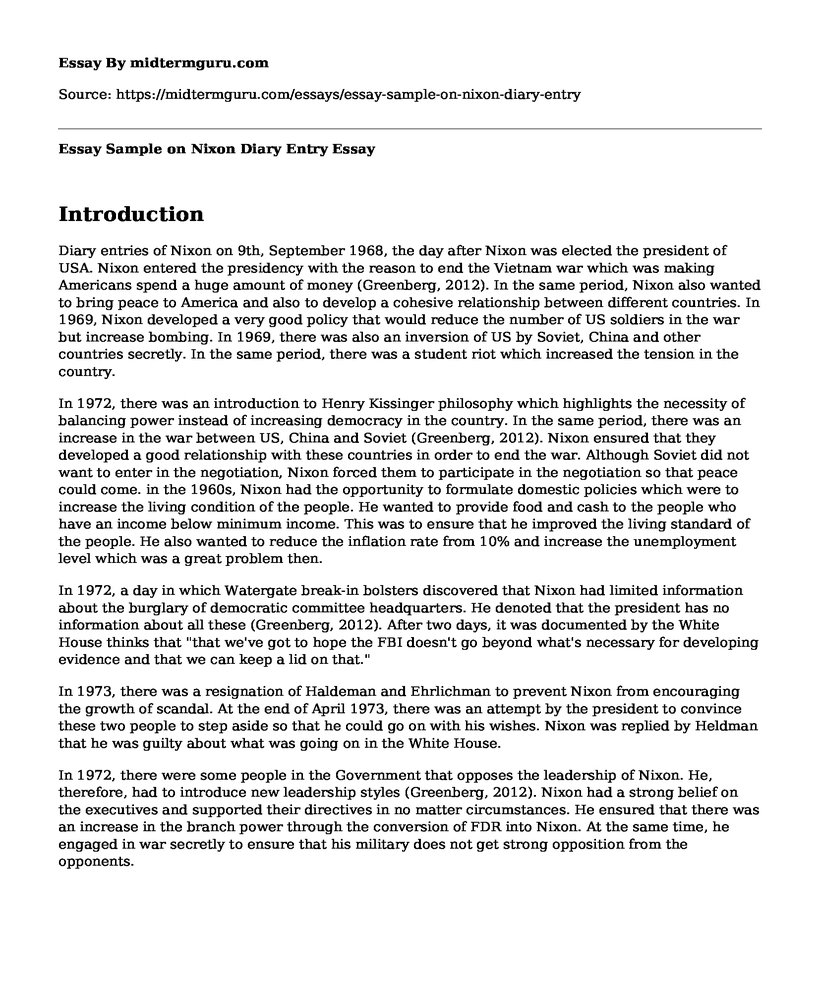Introduction
Diary entries of Nixon on 9th, September 1968, the day after Nixon was elected the president of USA. Nixon entered the presidency with the reason to end the Vietnam war which was making Americans spend a huge amount of money (Greenberg, 2012). In the same period, Nixon also wanted to bring peace to America and also to develop a cohesive relationship between different countries. In 1969, Nixon developed a very good policy that would reduce the number of US soldiers in the war but increase bombing. In 1969, there was also an inversion of US by Soviet, China and other countries secretly. In the same period, there was a student riot which increased the tension in the country.
In 1972, there was an introduction to Henry Kissinger philosophy which highlights the necessity of balancing power instead of increasing democracy in the country. In the same period, there was an increase in the war between US, China and Soviet (Greenberg, 2012). Nixon ensured that they developed a good relationship with these countries in order to end the war. Although Soviet did not want to enter in the negotiation, Nixon forced them to participate in the negotiation so that peace could come. in the 1960s, Nixon had the opportunity to formulate domestic policies which were to increase the living condition of the people. He wanted to provide food and cash to the people who have an income below minimum income. This was to ensure that he improved the living standard of the people. He also wanted to reduce the inflation rate from 10% and increase the unemployment level which was a great problem then.
In 1972, a day in which Watergate break-in bolsters discovered that Nixon had limited information about the burglary of democratic committee headquarters. He denoted that the president has no information about all these (Greenberg, 2012). After two days, it was documented by the White House thinks that "that we've got to hope the FBI doesn't go beyond what's necessary for developing evidence and that we can keep a lid on that."
In 1973, there was a resignation of Haldeman and Ehrlichman to prevent Nixon from encouraging the growth of scandal. At the end of April 1973, there was an attempt by the president to convince these two people to step aside so that he could go on with his wishes. Nixon was replied by Heldman that he was guilty about what was going on in the White House.
In 1972, there were some people in the Government that opposes the leadership of Nixon. He, therefore, had to introduce new leadership styles (Greenberg, 2012). Nixon had a strong belief on the executives and supported their directives in no matter circumstances. He ensured that there was an increase in the branch power through the conversion of FDR into Nixon. At the same time, he engaged in war secretly to ensure that his military does not get strong opposition from the opponents.
Conclusion
At the end of 1971, Nixon engaged his military to fight liberals and intellectual's radicals secretly. This was aimed at achieving all his legacy related to ending to Vietnam war moving the USA away from bipolar conflict of the cold war which made them lose many soldiers. It was also aimed at developing a relationship with China to increase international trade between them. In 1973, Nixon ensured that he practiced empirical presidency which could improve the image of the presidency in the USA.
Work Cited
Greenberg, David. "Nixon's Image: A Brief History." A Companion to Richard M. Nixon, 2012, pp. 519-545.
Cite this page
Essay Sample on Nixon Diary Entry. (2022, Oct 01). Retrieved from https://midtermguru.com/essays/essay-sample-on-nixon-diary-entry
If you are the original author of this essay and no longer wish to have it published on the midtermguru.com website, please click below to request its removal:
- Personal Insights Regarding Julia Alvarez and Harlem Renaissance Poets
- Essay Example: The Fourteenth Amendment
- Compare and Contrast Essay on the Causes of World War I and World War II in Europe
- Slave Trade and the Functioning of Enlightenment - Essay Sample
- Spanish Civil War: The 3-Year Conflict Between 1936-1939 - Essay Sample
- Japan's WWII Trauma: Psychological & Physical Scars - Essay Sample
- Revolutionary War in Great Britain: Pain, Death and a New Nation - Essay Sample







